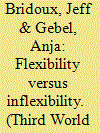| Srl | Item |
| 1 |
ID:
116837


|
|
|
|
|
| Publication |
2012.
|
| Summary/Abstract |
This article analyses US discourses on democracy promotion and anti-corruption strategies. The analysis shows that there is a cosmetic agreement in these discourses on notions of the good society that identify democracy as a good thing and corruption as a bad thing. However, despite this agreement, there are differences in the discourses on the measures recommended to promote democracy and fight corruption that may lead to policies and processes pulling in opposite directions. This discrepancy arises, on the one hand, from a mode of operation of democracy promotion that is flexible and adaptable to various contexts and, on the other hand, from the uncompromising and inflexible language of anti-corruption policies that threatens to 'undo' what US democracy promotion's rhetoric aims to achieve: ownership and sustainability of democratic reforms through re-empowering the state.
|
|
|
|
|
|
|
|
|
|
|
|
|
|
|
|
| 2 |
ID:
168593


|
|
|
|
|
| Summary/Abstract |
Scholarship on US foreign policy regularly claims that US democracy promotion policy is informed by a coherent and harmonious set of basic premises. In this article, I first examine the validity of this claim for US post–Cold War administrations. I find operational in US foreign policy rhetoric three stable premises: that democracy is a universal(ly aspired to) principle, that external democracy promoters are legitimately involving themselves in another country's political affairs, and that this policy endeavor is in the best interest of all involved stakeholders. Following theoretical expectations that culture and cultural aspects are relatively stable and adaptable entities and promote stability in behavior, I then pursue the question of how these premises have fared in an environment particularly challenging to their validity, namely in the case of US democracy promotion in Egypt. I show how, even in light of contradictory evidence, the basic premises remain resilient and function as a discursive structure that enables and constrains policy options.
|
|
|
|
|
|
|
|
|
|
|
|
|
|
|
|